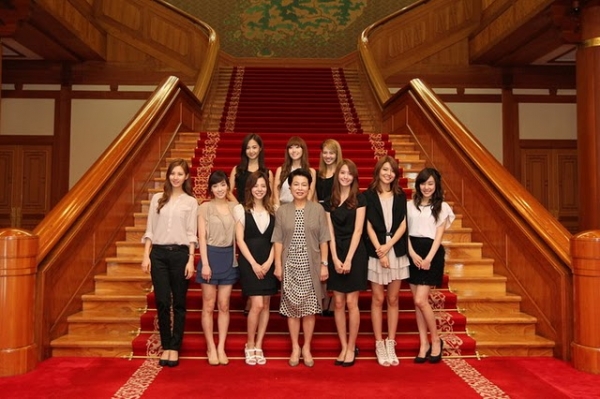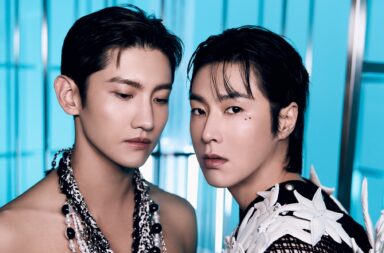Who says there’s no room for serious issues like politics and global affairs in K-pop? That’s what we’re talking about this week. With the death of Kim Jong Il, everyone in the international community has been reacting, including our favorite idols. But besides reacting, will the death of Kim Jong Il and the change in North Korean leadership — which is a major turning point in the narrative between North Korea and South Korea — have any effect on idols and the entertainment that they produce. Is K-pop ever socially and/or politically aware?
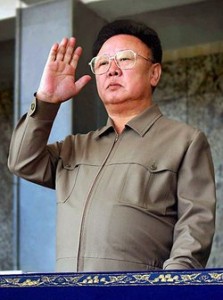 Madina: It will be politically and socially aware as much as the management companies would allow it to be. Which is zip. Zilch. Nada.
Madina: It will be politically and socially aware as much as the management companies would allow it to be. Which is zip. Zilch. Nada.
Nabeela: Yeah, I’m not sure if idols or their entertainment companies will so much as bat an eyelid about this. It’s not like South Koreans much less their idols have any sympathies for their northern, communist counterparts. I mean, everyone knows what has happened–for the love of God, Siwon tweeted (with correct grammar might I add) about the dictator’s death while the news was still hot off the press.
As far as awareness goes, everyone and their mom knows. But I don’t think anyone is going to change pace though. If we’re talking political and social happenings, though, then we’re in a whole other ball game. Since we’re talking about North Korean politics, I’m sure South Koreans drank to one more when news of Kim Jong Il’s death broke out. But should something in the homeland happen, like the death of the South Korean president, undoubtedly the music industry would be forced to recognize events in a different manner. Certain promotions and shows may be suspended as broadcasting turns the media’s attention to the political realm. But again, we’re talking about a hugely drastic scenario.
In any other circumstance, I don’t think the Korean entertainment industry would come to a standstill in light of any other major political event. Obviously, Korean culture is deeply rooted in respect and observance, but at the end of the day, Korea is still a capitalistic society. Life goes on, and so would Korean entertainment.
Gil: I mean, this will blow over in a couple weeks and K-pop will be back to its normal routine of singing, dancing, and cross-dressing. From what I have experienced, I don’t think politics is really intertwined with K-pop, unless you count exporting Korea via Hallyu. I mean, how much money does Korea make out of all these international fans being interested in K-pop? Can we find out how much money companies make from overseas concerts and whatnot? As an aside, I would kindly like to remind everyone of MOGEF who likes to ban things, specifically lyrics about drinking.
 Natalie: I would argue that social and political events do affect K-pop, even if it’s just a little bit. K-pop has to follow the likes and desires of the people to stay in business, doesn’t it? Aegyo or girl power (which I saw a lot of this year), a sexy concept or a cute concept – they all have to do with whatever the companies believe the public would want. Since society is always changing, K-pop, too, must change. Now, I’m not savvy about Korean culture or thought, but maybe this political development could lead to a lot of “let freedom ring” songs in 2012.
Natalie: I would argue that social and political events do affect K-pop, even if it’s just a little bit. K-pop has to follow the likes and desires of the people to stay in business, doesn’t it? Aegyo or girl power (which I saw a lot of this year), a sexy concept or a cute concept – they all have to do with whatever the companies believe the public would want. Since society is always changing, K-pop, too, must change. Now, I’m not savvy about Korean culture or thought, but maybe this political development could lead to a lot of “let freedom ring” songs in 2012.
But what about that tourism video Miss A and 2PM were in? K-pop is used as a way to export Korean culture spread it throughout the world, which can also be a political move besides a business move. A larger interest in Korean culture and products would mean more foreign affairs, wouldn’t it? Other international entertainment companies could reach out to Korea in the future for movies, music, collaborations, etc.
Patricia: The unique thing about K-pop as a musical genre is that it is firmly and inescapably tied to Korea and Korean culture as a whole. When you’re exporting K-pop, you’re exporting Korea as well. Think about how many K-pop fans suddenly garner an interest in Korean food, Korean tourism, and everything that has to do with Korea simply out of their love for K-pop. In that sense, K-pop and Korean culture/politics/society theoretically go hand in hand, because an interest in K-pop oftentimes leads to an interest in Korea.
But the real question is: Are K-pop fans interested in Korea, or are they interested in the fantasized version of Korea that is nothing more than an extension of the fanciful land of K-pop and K-dramas? For many K-pop fans outside of Korea, K-pop has become an escape, a land of imagination where the pains and sufferings of real life don’t exist. There’s nothing wrong with treating K-pop as a form of escape and fantasy — anime and manga fans have been doing it for years — but the danger in doing so is found in K-pop’s indelible connection with Korea, which is a real country with real issues. Many K-pop fans believe in Fantasy Korea: where every street is a scene straight out of Boys Over Flowers, where every person on the street is as good-looking as Lee Minho and Yoona, where you can eat all the bibimbap you want and still be as thin as a pipe.
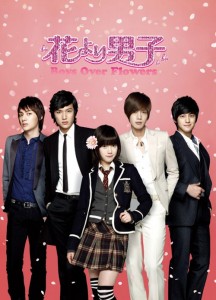 So when the fans’ perception of Fantasy Korea collide with a real-life crisis in Korea, you’re going to get a bunch of K-pop fangirls whose first thoughts are the safety and well-being of their oppas. It’s easy to say that these fangirls are just being ignorant, but I think the issue runs a lot deeper. If the fans’ only perception of the ROK is that of Fantasy Korea, then of course the only thing they’ll think about is their favorite K-pop stars, because K-pop is the most important thing in Fantasy Korea. To put it in an extreme fashion, many international K-pop fans have fetishized Korea, to the point where their interest in “Korea” could easily be deemed cultural ignorance.
So when the fans’ perception of Fantasy Korea collide with a real-life crisis in Korea, you’re going to get a bunch of K-pop fangirls whose first thoughts are the safety and well-being of their oppas. It’s easy to say that these fangirls are just being ignorant, but I think the issue runs a lot deeper. If the fans’ only perception of the ROK is that of Fantasy Korea, then of course the only thing they’ll think about is their favorite K-pop stars, because K-pop is the most important thing in Fantasy Korea. To put it in an extreme fashion, many international K-pop fans have fetishized Korea, to the point where their interest in “Korea” could easily be deemed cultural ignorance.
Yes, I know I’m overgeneralizing. Sue me.
Subi: Interesting thought. But in order to tie it back to the question and the matter at hand, K-pop is not, in the least bit, socially or politically aware. An event like the death of Kim Jong Il, which as serious as it may come for South Korea at the given moment in time, will have no observable impact on the K-pop industry. Like you said, Patricia, K-pop exists in idealizations: visually, musically, and conceptually. Everything and everyone looks, sounds, and acts perfect. To acknowledge something like serious political and social issues would be to acknowledge the not so ideal and that would create a complication that K-pop could not sublimate.
Natalie: No, Patricia, I agree with your generalization. It isn’t a very pretty generalization but it can’t be ignored, and it’s so right to link it to the fantasies that animanga fans have with Japan. Koreaboos and weaboos (I’m still not sure if those terms are offensive or not) do tend to be very delusional, willingly so. They believe Japan and Korea to be paradises. But in Korea’s case, I think this is aided by K-pop and K-dramas a lot, as they also glamorize Korea.
 Maddie: I think the question is whether or not K-pop is politically active/involved. They must be politically/socially aware. At the end of the day, idols are citizens and so are their families. They have their own opinions but what reporter or journalist would ask them about their thoughts and would that be of any interest to a fangirl or would their comment even be taken seriously? No. So why ask or involve them? Also, if they were to voice an opinion they’d need to be careful about what they say as not to offend anyone or represent the company in a bad light.
Maddie: I think the question is whether or not K-pop is politically active/involved. They must be politically/socially aware. At the end of the day, idols are citizens and so are their families. They have their own opinions but what reporter or journalist would ask them about their thoughts and would that be of any interest to a fangirl or would their comment even be taken seriously? No. So why ask or involve them? Also, if they were to voice an opinion they’d need to be careful about what they say as not to offend anyone or represent the company in a bad light.
K-pop may be a fantasy world where everything is perfect and everyone is “beautiful”. Some like to use it to escape and I don’t see why there is anything strange about that. It is entertainment, after all.
K-pop may lead to a glamorized view of Korea and it is understandable — it happens with the US as well. Before K-pop, all I knew about Korea (north and south) was what I had learned in my AP US history class in high school, and even that was just a brief lesson on the US’ involvement in the Korean War. Why wouldn’t people think Korea is perfect and every girl is rocking Michael Kors when pop culture is the only Korean culture most outside of the country are familiar with?
K-pop may lead to a deeper interest in Korea, and in my case, it already has. if anything interests me more, it’s the business and marketing aspect as well as its role within Korean culture as a whole. It’s very small and when I ask my clients (both Korean-American and Korean tourists), they’re indifferent if not annoyed about K-pop.
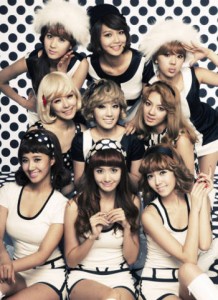 When SM Town was in NYC, I asked a client (Korean tourist) if she was excited about SNSD staying just a few blocks away from Sephora. Her reaction was, “Oh, you know about them? That’s nice they’re here.” Neither she nor the girl she was with really cared. Also, today, I got into a conversation with a Korean-American client on plastic surgery in Korea. I mentioned how cute her nose was and she told me how “everyone” wants a “higher” nose. I said, “Oh, like with K-pop artists?” She then wrinkled her nose with kinda disgust and simply said, “Yeah.” End of discussion.
When SM Town was in NYC, I asked a client (Korean tourist) if she was excited about SNSD staying just a few blocks away from Sephora. Her reaction was, “Oh, you know about them? That’s nice they’re here.” Neither she nor the girl she was with really cared. Also, today, I got into a conversation with a Korean-American client on plastic surgery in Korea. I mentioned how cute her nose was and she told me how “everyone” wants a “higher” nose. I said, “Oh, like with K-pop artists?” She then wrinkled her nose with kinda disgust and simply said, “Yeah.” End of discussion.
I agree with what both Subi and Patricia have stated, but I also feel that K-pop is a product, and political view points or involvement concerning Kim Jong Il’s death may not really be in demand. If Suzy wearing a shirt with a lace back causes madness amongst netizens, imagine what a negative or ignorant comment from a company or an idol would cause.
Natalie: Ah, that is very true. I forgot how netizens are so nit-picky. Celebrities are criticized everywhere, but in Korean entertainment it can get a little ridiculous. I’ve always wondered about the political and social opinions of many idols but have resigned myself to probably never knowing. Idols and their companies are too image-conscious to freely express themselves in these areas, and if they did, people are going to get upset.
